- Home
- Carol Bruneau
A Circle on the Surface Page 2
A Circle on the Surface Read online
Page 2
Una had no patience for the idea of an afterlife of any sort. His ma, however, believed in purgatory, a netherworld between heaven and hell. For Ma, limbo was no ethereal place. She had visualized it as a theatre crammed with everyone who had ever lived, each person forced to re-enact all their earthly errors before the audience while simultaneously watching themselves on the theatre’s gigantic stage or screen. A play or a movie that ran continuously until God decided it could stop. Possibly this was an idea Ma’s priest had fed her.
“Your gran had some funny notions. She didn’t mind sharing them, especially with your mom. Your mom was looking after her when Ma died, see. We’d only been married a few months. It probably wasn’t the best arrangement.”
Listening to such ideas, no wonder Una had felt cooped up. No wonder she left Ma alone when she should not have. It was a small error in judgement; he has long forgiven her for it.
“Notions like what?”
“Oh, about places, imaginary places, where the action runs non-stop. Movies and such.”
Pen peers at him, the bridge of her nose wrinkles. “What’s bad about that?”
“Well. Just think of the performers, how they’d feel. Think if everybody had to go onstage. Not just actors. Pianists, practising their Hanons with no break.” He winks.
He’s stalling, of course. She shakes her head, perplexed. It’s a good thing she can’t see inside his. He’s thinking about himself and Una, how if they wound up in Ma’s purgatory, facing some eternal judge or audience, in their scenes they might appear separately. And it would not be on a screen, but on a stage of bald granite. He pictured himself standing on a whaleback surrounded by crow- and blueberry bushes, scouring a high barrens for some sign of her, and Una slipping from a rock by the sea.
“Sweetpea?” He takes a smaller sip, it goes down just fine. For all he knows, that’s where Una’s life ended, near a rock. He walks his fingers along the arborite, along the tabletop’s metal edging, playing an octave he pretends to hear.
“She liked to swim.” The words float on the lip of his glass.
“You’re going to tell me how I was born? I know babies, real babies, don’t hatch.” She blushes, and he guesses she’s thinking of the “baby” in Elvis’s “Hotel.” God almighty, what he would give to save Pen from the grief behind a song like that!
“I’ll tell you what I can.” No one can know the heart of another person, his neighbour, Win Goodrow, had said. “Hatched. You mean like a duck. A turtle. What’s that joke I heard Hannah tell you? About tadpoles. A dirty one, wasn’t it?”
He beams at her then and a warmth floods his face, a strange, uncomfortable warmth, the recognition of love, old love, a love he thought was well behind him. He leaves the envelope where it is, and his hankie, too, with its little treasure inside, though he might need to pull the hankie out and blow his nose.
“Do the math,” he has always told her and Hannah. When something appears to make no sense, try doing the math. And when Pen asks if he really is her father, that’s what he’ll say.
If only words could be shaped with the logic of numbers in the way that music was, and could only convey harmony. If only the dead, like stray notes, spoke for themselves.
2
June 1943
In the world where Una Greene liked to think things made sense, it would be reasonable to say she spied the man first, high above her in the dunes, and well before the man spotted her. She was desperate for fresh air. Not quite summer, the breeze had a nip but a welcome one. It reminded her of being in school. She was glad to be away from the sickroom.
The man had something in his hands and, bringing the object to his face, aimed it at the sea and its infinite blue. Una was too far away to see, at first, that the object was field glasses. Youthful, tallish, bare-chested, the fellow wasn’t much more than a stick figure against the cloudless sky. His face was shadowed by glare. Focused though he was on the surf, his presence felt intrusive. This was her spot, this sandy pocket above the beach, where Una came every chance she could, to collect herself. A small, secret spot in the dunes, away from the stuffy little cape house in the village, with its knick-knacks and medicinal smells and her mother-in-law. Tending the sick was not what Una had imagined signing a marriage license would mean. She was a teacher, not a nurse.
God forbid she and Enman would be stuck in this place much longer. But, should things drag into July, this was a good spot to sunbathe. She had thrown on her suit before fleeing the house, pushing summer a bit. A couple of days shy of the solstice, the sun was almost its strongest—her favourite season, even though she loved teaching. What devoted teacher didn’t relish the summer break? Being far removed from the classroom complicated this summer’s anticipation, made it bittersweet. Una missed the kids, even their runny noses.
Lying on her stomach, she smoothed out Mrs. Greene’s blanket. Easing down her bathing suit bodice, anxious to start a strapless tan, she flattened herself to the blanket’s moth-eaten wool. It smelled of Beecham’s licorice cough drops, or worse. She longed to relax into its warmth, but something prevented her. It was as if the marram were a field of antennae around her, each blade of grass picking up her every move. Being housebound made her anxious, wary. No, looking after Mrs. Greene only sealed the fact of being marooned somewhere. This place was so small and backward that its residents shunned anyone not born here. As if anyone who wasn’t a native should just scuttle for cover under a rock.
“Don’t be silly.” This was Enman’s take on her feelings, her husband given to such comments. Barrein-born and bred, of course, he had been quick to marry her, and she was the better for it. “It’s your imagination in high gear, sweetie. Why do you think everyone’s watching you?”
Perhaps not everyone. Not this particular man, anyway. He had briefly turned his lenses her way before training them again on the water. Perhaps he mistook the waves breaking over shoals as the spume from a pod of whales sounding. She had mistaken this phenomenon for whales until Enman had pointed out and named various undersea hazards, one of which had the colourful name Mad Rock. To the naked eye these rocks and shoals looked like lines of white froth just before the horizon, and not far from the low, rocky island out there with its very old lighthouse. Its revolving beam, which Enman said had aided seamen since the 1700s, was imperceptible now, extinguished or absorbed by the sun. Maybe she just imagined the absence of its revolving flash? The man was, however, as real as the neighbours’ whispers and snarky glances. She was pretty sure he didn’t “belong,” as they said around here, though wouldn’t this observation coming from her amount to the pot calling the kettle black?
The males around here were either seniors or infant boys. In the middle of a war or not, there was nothing in Barrein to keep hold of a young man with brains—which Enman had been once, she was certain—and nothing, alas, to prevent one’s returning. Blood was thicker than water, apparently. She and Enman had only been married three and a half months when Mrs. Greene took ill, and he had resigned from his banker’s position in the city to move them in with his mother. Packing up everything in their flat, he promised it would only be for a little while. Una supposed in a way it was a good thing she hadn’t been working. Even in wartime the school board enforced the rule that no married women could teach classes.
For all she knew the man with binoculars “belonged” as much as her husband did. Why else would he be here, even for an afternoon? A weekday afternoon at that, when even in Barrein most men, including Enman, were at work. Enman had managed to take a stopgap job doing the books at the tiny boatyard down the hill from his mother’s. An office job, he called it. Working in a dank little building by the wharf, totting up accounts received and payable, to the smells and sounds of a welder, a riveter, and a machinist at work. This, when he had been in the running for assistant manager at the bank’s main branch on Hollis Street. And look at her, after twelve years of teaching, left to s
ponge-bathe an eighty-year-old when she wasn’t fetching the old lady’s smelling salts or watching her doze. It was not where Una had hoped to be in her thirty-seventh year, not after dedicating herself to the classroom. If she got slightly impatient sometimes and her imagination was overactive, it was out of boredom. Boredom that, she was sorry to think, was largely Enman’s fault.
Whoever the man was, he had yet to move off or show signs of noticing her. Her stomach to the blanket, she took advantage of his preoccupation with the scenery to arch herself up enough to pull up the top of her suit. Its stiff cotton and a touch of grit inside the material felt bothersome. Was her body unusually sensitive? Such tenderness meant either that her period was coming or that—perhaps—it wasn’t. Which either way meant suffering, as her friend Kit would say. While still giving her all to teaching, Una had been inclined to agree, thinking children were better enjoyed at a distance. But, getting married, Una had soon opened herself to the idea of getting pregnant, having a child of her own to dote on. By Valentine’s Day, two months before landing in Barrein, she had thought, Why not? The only problem was Enman didn’t seem terribly keen.
A vague hopefulness flexed itself as she rolled over and sat up.
Lowering the glasses, the man saw her then—and only then, she felt sure, as he raised his hand in a startled wave. A stranger certainly, most likely a local who had left a long while ago and had, until now, the sense to stay away. A true local would have pretended she wasn’t there. So—a youthful visitor, from town or further afield?
She sat straighter, shoulders back, which had the effect of emphasizing her chest. Posture, said her inner voice, her teacher’s voice, the way she had reminded her students: shoulders tucked, head held high, chin lifted. She was no Betty Grable, but now that the man had truly noticed her, he kept looking. Shaking out her striped towel, she draped it over her thighs. Coming home briefly for lunch, hearing of her planned jaunt to the beach, Enman had cautioned her about sunburn, “especially with your complexion.” She was fair for having such dark hair. “I’ve got nothing against freckles, my darling, but if I wanted a lobster I’d cook one.” Her husband said things like that, being funny.
When she looked up again the man was gone, his absence highlighted by the forlorn zigzagging line of spruce backing the dune—no sign of him or anybody against a swath of woods or the length of the beach.
A mirage, was he? Mrs. Greene was always nattering about ghosts, the ghosts that inhabited this stretch of shore. Shag’s Cove was where the old woman’s people had lived briefly, arriving from Massachusetts too many years ago to count, before they had pulled up stakes and moved all of two miles to the narrow, sheltered harbour in Barrein. This was one of Mrs. Greene’s favourite memories. Sitting at her bedside, Una had heard it umpteen times. Enman, being at work, was spared these stories. Now, a certain disappointment darkened Una’s view of the shoreline before her.
“Come back, whoever you are,” she wanted to call out, flexing her toes slowly. Sparkly white sand sifted between them. The sad stirring in her throat echoed the sand’s fine drifting. She could have used someone to talk to—and there it was: we all could use someone to talk to. The sense took hold, as it too often did, that, like the beam of light out on the island, she was invisible. Invisible the way women became at a certain age. And following that sense was the thought that life, her life, was swimming by like some finned creature out there in the deeps.
Already it was time to go back, to give Mrs. Greene the pills the doctor from O’Leery prescribed. No one seemed to know what exactly ailed Enman’s mother, besides age, although the doctor had mentioned pleurisy, heart trouble, a slew of other possibilities, Mrs. Greene’s body simply, inevitably, shutting down.
On impulse, Una made a brief stop on her way back to captivity. She would be back soon enough, taking up position in that upstairs room. It was the bigger of two airless bedrooms in the one-and-a-half-storey house, their space diminished by low, sloping ceilings. If she hurried she would make it to the schoolhouse before the teacher left for the day. The one-room school occupied a shabby building not far from Barrein’s only store. The yard outside lacked a tree, let alone a swing. Miss Rooney, fresh out of Normal School, had pupils from grades primary through twelve, although most children around here quit before grade eight or nine. With the school year soon ending, Una thought Carmel Rooney might appreciate help. Una could do some marking, pack up textbooks, order bookplates from The Book Room in town as prizes for Miss Rooney’s top students. At least these small tasks would help her keep a finger in the pie, provide some relief from what felt like house arrest. The novice teacher needn’t mention a thing to the school board people.
Una arrived at dismissal, ten or twelve children of various heights and ages flying like birds from the coop. She smiled at them as they passed her. Miss Rooney was already outside, beating a blackboard brush against the school’s paintless shingles. Looking harried and suspicious, as if Una was angling to steal her job, the teacher thanked Una for her interest but said she had managed this far and any help would be too little too late. Then Miss Rooney disappeared inside, barely murmuring goodbye.
Letting herself into Mrs. Greene’s kitchen, Una poured some lemonade and gulped it down, then put a glass of water on a tray with saltines. She should have baked something, tea biscuits maybe, or tried to. She hated baking and the taste of anything made of flour was bound to elicit some tale about the merits of Purity over Red Rose brand, and how Mrs. Greene and Iris Finck, the widow shopkeeper, had a long-running debate concerning these. Stifling a sigh, Una started upstairs. She waited for the old woman to call out, “Is that you, dear?” As if it could or would be anyone else. Age and sickness had not hurt her hearing.
When Una crossed the threshold, she knew things weren’t right. Mrs. Greene’s breathing was laboured and harsh. The old woman was lying under her quilt in the dimness, the window blind as Una had left it, drawn down to block the sun. Mrs. Greene’s eyes were wide and frightened, her hands appeared blue. Una took them in hers and rubbed them. They felt awfully cold. She held the water to Mrs. Greene’s lips, but it trickled down her chin onto the neckline of her nightie.
“Help!” Una cried out. She hurried downstairs to call the doctor. His office in O’Leery was fourteen miles away, the nearest hospital, in the city, five or six miles beyond that. Doctor Brunt was presently on a house call, his secretary said. Una hung up and called the boatyard. Enman answered. It would have wasted precious minutes explaining things to his boss, another octegenarian, a relic really. Grizzled and half-deaf, Isaac Inkpen was as old as dirt, Mrs. Greene had once said. It sounded funny then but didn’t seem so funny now.
Una spoke slowly and clearly, as if it were a long-distance call.
“I think, dear, it’s happening. I think you’d better come home.”
3
Holding his mother’s wake in the parish hall would have been convenient. But Enman thought it more fitting to use the front room of the house his ma had grown up in and resisted leaving. The house Ma’s grandfather had moved there by barge when the mackerel and herring grew more plentiful in Barrein’s harbour than in Shag’s Cove.
Most of Ma’s neighbours came to pay their respects. They filled the small room, its plank floorboards groaning underfoot. Una handed out cups of tea, passed a plate of scorched cookies. The smell of burnt food drifted from the kitchen—she wasn’t yet used to the oil-fired range. Most people stood, but a few sat in chairs arranged around Ma’s casket, chairs the Goodrows had been kind enough to bring over. All four of the kitchen’s pressed-back ones were used to rest the coffin upon, leaving only an easy chair and a rickety ladderback from upstairs.
Father Heaney, Barrein’s elderly, hollow-cheeked priest, prayed the rosary over Ma, starting with the Creed. “‘…The communion of saints, the forgiveness of sins, the resurrection of the body….’” Greeley Inkpen’s wife, Isla, prayed along. Isla’s daughter, m
iserably pregnant, slouched on the horsehair sofa, hiding her eyes. The priest and Isla fixed theirs on the statuette on the corner shelf, Ma’s Beautiful Mother. A porcelain figurine of the Virgin Mary, symbol of mothering’s joys and sorrows, it had been found by a lighthouse keeper after a shipwreck, so the story went. A ship that had foundered off the nearby island, all hands lost, the keepsake passed down through Ma’s family. A miracle of survival, Ma had called it, wanting Una to have it.
“Long day for you, buddy.” Isaac, the Inkpen family patriach in his suit shiny with wear, thumped Enman’s shoulder.
Enman glanced at Ma’s face, sharp-featured and sunken in death.
“The longest.”
The first day of summer, a hard time to leave. Ma had loved the heat, he thought. Wouldn’t go near the beach, though, until mid-August, convinced that any sooner than that, swimming was a death wish, the water so cold.
Una’s friend from town came and stayed only long enough to drop off flowers. Hubley Hill gave Enman a curious look at that. Enman returned his look. “Should have brought your guitar along, Hill.”
Una put the flowers in a vase on Enman’s desk, next to a big bunch of pink and purple lupines Isla had picked from the hillside near their house.
“‘Salve, Regina, mater misericordiae: vita, dulcedo, et spes nostra….’” Father made the sign of the cross over Ma, then he and Isla sang two verses of “Saint Patrick’s Breastplate,” her favourite hymn. Isla’s voice reminded Enman of the furnace whirring as it started up in the apartment house where he and Una had lived in Halifax. Isla’s daughter rolled her eyes.
Isaac nudged Enman’s arm. “Marge was a good woman, a smart woman. She thought the sun shone out your arse.” The old man rubbed his stubbled jaw. “You wouldn’t have survived if you’d been left to your old man.” Enman had known Isaac all his life and mostly feared him. But since coming back to Barrein as an adult he was getting to know Isaac better, Isaac’s sons too, Greeley and Robart. Greeley was the boatyard’s machinist and mechanic, Robart its riveter and sheet-metal worker, and young Edgar Lohnes, who lurked in the hallway smoking, was Inkpens’ all-purpose labourer.

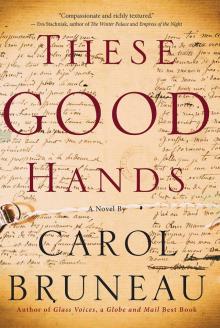 These Good Hands
These Good Hands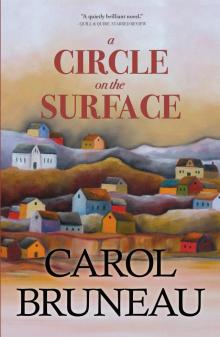 A Circle on the Surface
A Circle on the Surface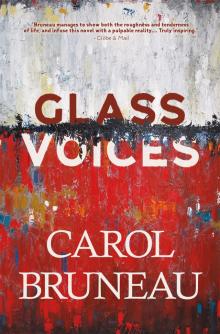 Glass Voices
Glass Voices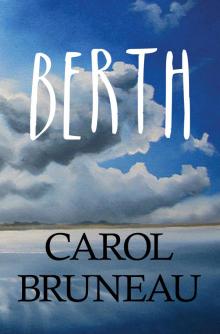 Berth
Berth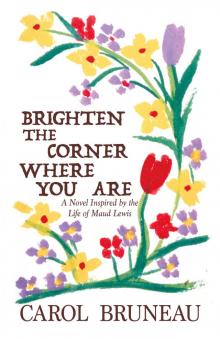 Brighten the Corner Where You Are
Brighten the Corner Where You Are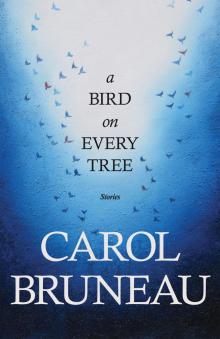 A bird on every tree
A bird on every tree